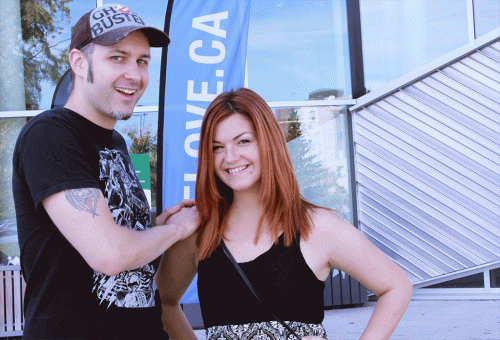By Arielle Follett

Horror films will no longer be an old boy’s club if Jennifer Allanson and Kristian Lariviere have anything to do with it.
Allanson, actress and former Algonquin student, teamed with television broadcasting graduate Lariviere, plan to change the genre for the better.
“Jen came to me with the idea and we decided to write a script,” said Lariviere, who holds the role of director as well as co-writer and co-producer alongside Allanson.
The movie, named Hen’s Night, follows the story of a bachelorette party gone wrong. The five main characters of the story are all women, one of which Allanson portrays.
The writers keep the story close to their chest, not wanting to reveal any spoilers, only general comments.
“It’s scary!” said Allanson. “It deals with real women issues, like woman-on-woman hatred. The scariest thing about it so far is that it’s so accurate.”
Lariviere agreed.
“While we wrote this together, the characters would do things and I’d just say to Jen, ‘A man would never do this.’ It’s a very different kind of scary. It’s not a slasher.”
In most horror movies, the consequences of deaths are not seen and there is very little time to mourn a character, they agreed. The characters eat up screen time until they die.
“The hope is that people will come to care about the characters,” Lariviere said. “It’s slower and people will probably look back by the end and think ‘Oh man, things really got out of hand.’”
This is the pair’s first feature-length film. They have worked together on some short films together in the past, played in local film festivals and competitions.
It deals with real women issues, like woman-on-woman hatred. The scariest thing about it so far is that it’s accurate.
“It’s a marathon filming a feature,” said Lariviere. “We putting in multiple consecutive 18 hour days. It’s mentally and financially very hard.”
The film has been funded so far by a combination of an Indiegogo campaign, a bachelorette-themed fundraiser and some sponsorships.
“A feature really tests your skills,” Allanson said. “Myself and the other girls in the film were talking recently and all agreed that this film has made us all much better actresses.”
Lariviere’s behind-the-camera skills have been tested by the film as well.
“I have to step up my game,” he said. “You can’t just treat it like a long short-film. The production value has to go up.”
The cast and crew have impressed themselves so far with what they have produced.
“In the middle of the total exhaustion of these long days, we all looked at each other and realized that this has become much bigger than we originally anticipated,” Allanson said.
The pair credit the ability for this movie to happen to Algonquin. Lariviere graduated in 2003 and still uses the skills he learned over a decade later.
“They teach you how to shoot, how to light and edit, how to do sound and how to work with post-production,” he said. “The technology may change, but the basics always stay the same and they make sure you know them.”
Of the film’s main crew of about 10 people, six of them are former Algonquin students or grads.
“Algonquin’s programs force you to do everything once. It lets you see your strengths,” said Allanson.
The pair hope to give some opportunities to current Algonquin students.
“We’d love to get some broadcasting grads behind the camera or some talent from theatre arts,” said Allanson.
“We have a very recent television broadcasting grad on set right now and he gets to really see everything work,” said Lariviere. “Because this is a smaller scale, he can come up close to everything, talk with the director one-on-one, ask questions – all of those things he wouldn’t get to do on a Hollywood movie set. We’d like to give that opportunity to more people.”
The twosome are very proud of what they have created so far.
“At the very least, it’s unique,” said Lariviere.
“And it’s very different from what we first had,” added Allanson. “We changed the whole ending. We were filming a scene and we all decided that this felt like a great ending and went with it. Overall, we’ve had like 12 rewrites.”
Allanson and Lariviere’s ultimate goal is to have people look at horror differently.
“I want people to self-reflect and I want tears!” Allanson insisted. “Looking at what we’ve created, I don’t think that’s too far-fetched.”


